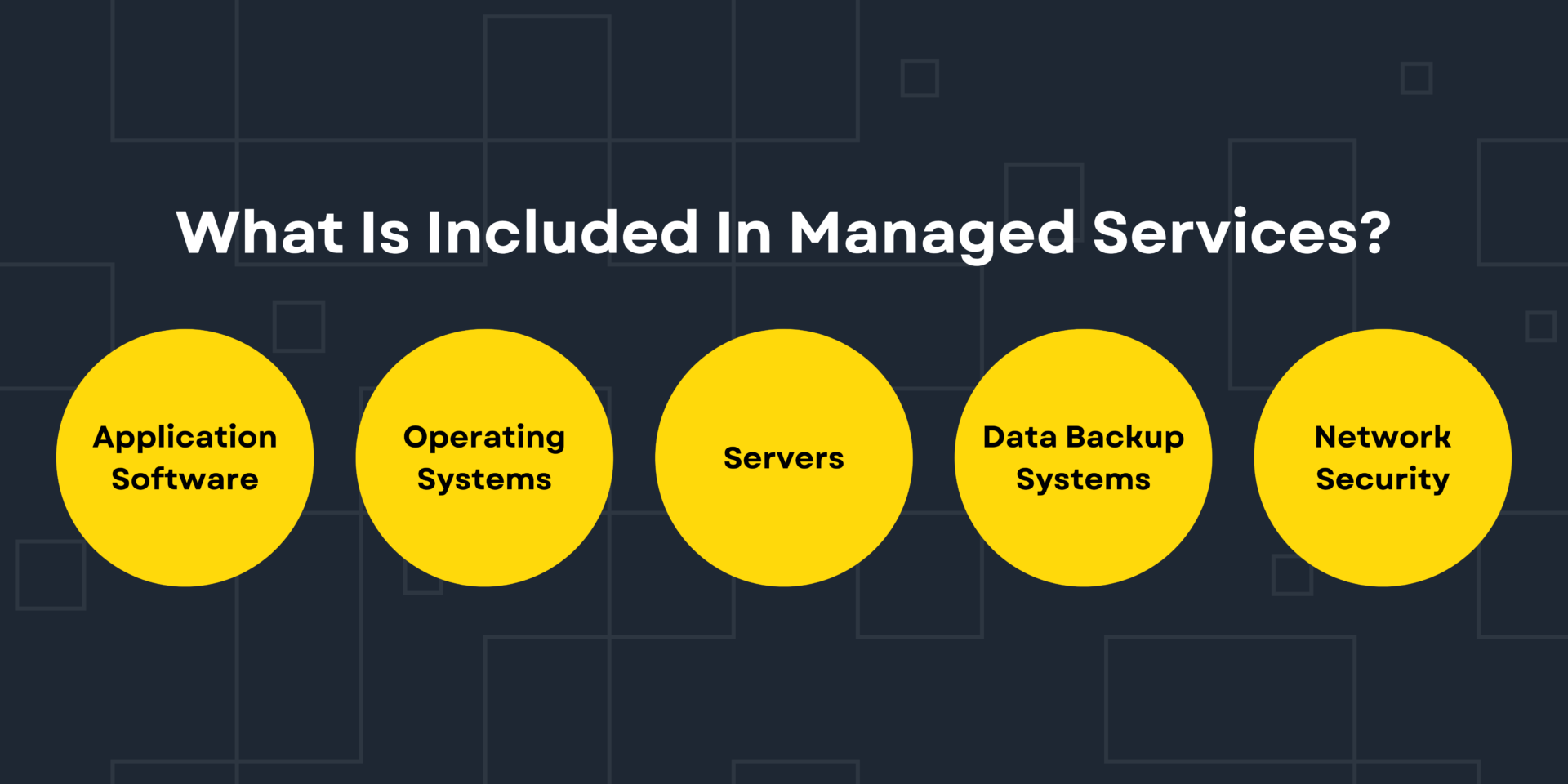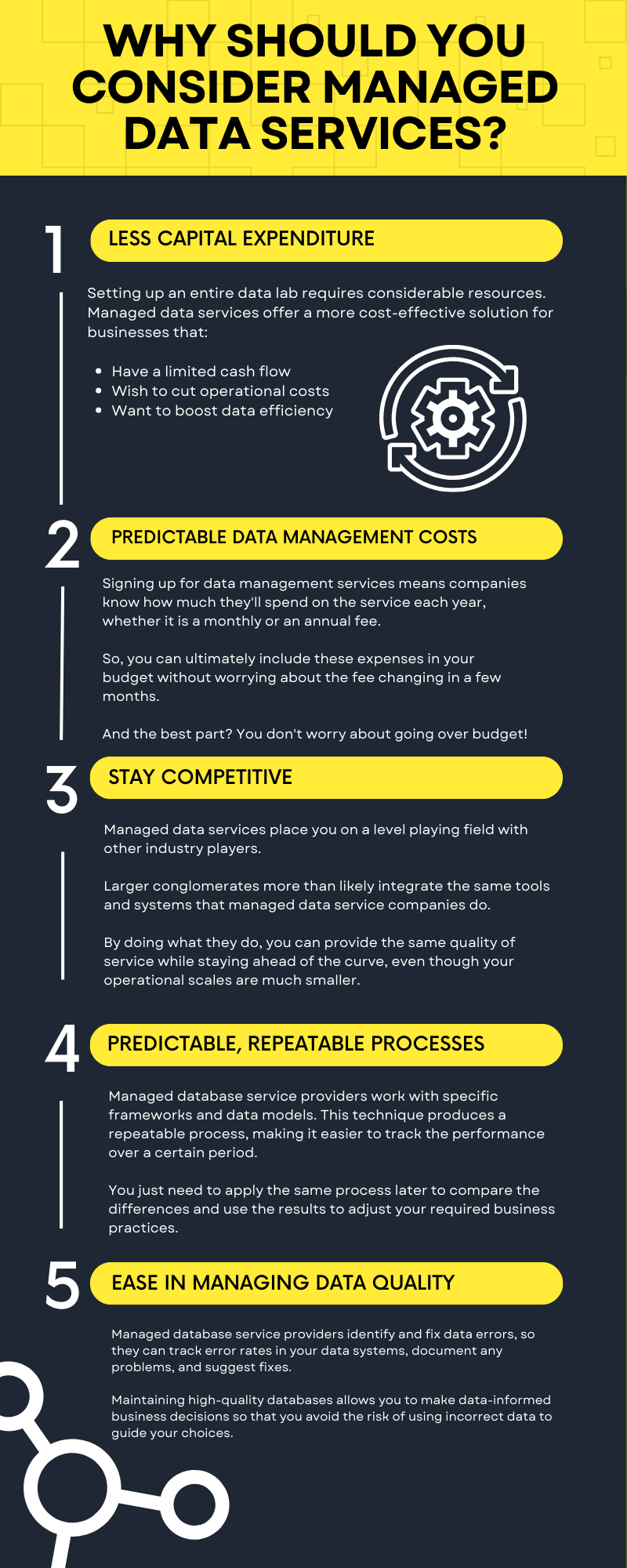Think of your dream product launch.
You’ve worked hard to develop your newest product. And now Launch Day is here. Your excitement borders on euphoria. The data is in. The number of hot leads is staggering. It’s better than you hoped for.
But as the hours pass, you realize the trickle of inquiries and sales doesn’t match your projections. Your team jumps into action to check what’s happening. They discover that only a few visitors can access the site.
What went wrong? Is there hope of fixing the glitch in time for a successful launch?
Below, we discuss how to avoid such a scenario with managed data services. Read on to understand how managed data service works and its benefits for your business.
What Are Database-Managed Services?
Database-managed services are specialized IT management services that deal with data management only. A client hires a third party specializing in these services to manage company data.
The data management service provider avails the infrastructure required to process, store, transmit, or dispose of the client’s data. They are also responsible for handling and monitoring data infrastructure.
What Is Included In Managed Services?

Managed services take care of the complete IT infrastructure. Database-managed service providers have systems to monitor and maintain:
- Application software: to ensure that requested tasks are executed fast and that the software returns the desired results.
- Operating systems: to allow all other applications to run smoothly.
- Servers: to ensure round-the-clock access to networks and other centralized resources.
- Data backup systems: to prevent data loss following a system failure or damage to infrastructure. Backup solutions restore systems promptly following outages.
- Network security: to prevent intrusion, data loss or theft, hacking, and malware.
They also have risk-management solutions, which means that they have processes to protect the client when an attack occurs. But the entire database-managed system is designed to prevent breaches. So attempted breaches will often be just that: attempts, not full-blown attacks.
And they provide data services.
“What is a data service?” you ask. These are part of cloud-computing web solutions that help with data aggregation, transmission, storage, or analytics.
Benefits of Managed Services
Businesses greatly benefit from using data management service plans. Major benefits include:
Improved Data Protection and Security
Often, small businesses don’t have the resources to deploy the best security systems or the personnel to maintain them 24/7.
By contrast, managed data service companies have data protection mechanisms to ensure that only authorized people can access company data. This level of data security is critical across all industries.
Clients wouldn’t think twice about abandoning an organization’s services once they discover how lax its data protection system is. Moreover, weak security systems could put the business in trouble with the law.
Now, legal problems and client distrust are equally disastrous for a business. Managed data services step in to protect an organization from all that.
Low Cost
Running an in-house data management unit can be expensive. The business has to invest in custom software, servers, and data backup solutions to manage its data.
And it doesn’t end there.
All these systems must stay up-to-date, and maintaining them is costly. But what’s more concerning is that they may need to be replaced with time as newer and better systems take their place.
With managed data services, businesses benefit from the same data systems without paying a hefty price to acquire them. The data management company provides all the hardware needed to run the services. And the business then pays an agreed-upon monthly or annual fee to access the infrastructure.
Scalability
Who better to rely on during a growth spurt than a specialist data manager? As experts, managed data service providers know how to plan for and handle sudden data surges. They also know what to look out for and what to do if things take an unexpected turn, whether for the better or the worse.
Imagine the rush during Black Friday or Cyber Monday. As more people turn to online bargains, many customers have difficulty accessing some of their favorite dealers’ sites to take advantage of the insane discounts offered.
In such a scenario, an ideal managed data service provider would accommodate the spike in demand for your services during these special days.
So many more customers access your e-shop and transact successfully. And you enjoy more sales, plus the loyalty of fulfilled customers.
Best of all, on days, months, or seasons when there’s reduced demand for your services, the managed data service will help you scale back. So resources don’t go to waste, and the business cuts down on expenses.
Ensure Compliance
Companies offering database management services have systems and technologies to monitor compliance with government and industry regulations. Businesses that opt to handle compliance checks may need to have a team that only deals with compliance.
Indeed, most will need a whole division for this. The department must have compliance experts, including legal experts, auditors, and professionals, responsible for implementing the changes demanded by compliance. An organization requires resources to do all this.
Handing this responsibility to a managed database operator ensures the business can stay compliant without expending resources they may not have.
Enhanced Efficiency
A business whose entire operation revolves around data management goes the extra mile to keep its data infrastructure in good condition all the time.
That’s what a data management service provider does. They optimize their software, hardware, and networks for the best performance.
For the client, this translates to:
- Improved reliability
- Minimal downtime
- Efficiency
- And increased productivity
New Technology Benefits
Managed data services use the latest technologies to deliver prompt responses, automated scheduling, and valuable insights that help push the business toward its goals.
Businesses may not have the resources to upgrade their data architecture or migrate to the latest technology. But by signing up for database-managed services, they leverage the service provider’s optimized technology and enjoy all the benefits it offers for a fraction of the cost.
Room to Focus on Business Growth
When an organization outsources data management to a third party, its IT workforce has less on its plate. They can now concentrate on other aspects of the business that need their input.
Many businesses cannot dedicate part of their workforce to data management because they lack enough human resources.
Assured Expertise in Data Management Skills
IT skills are manifold. A company can have a rich IT workforce but only a few personnel with expert data skills. It would be impossible for such a team to run a robust data department.
However, if the company engages a database-managed service provider, it gets a team of data experts at its disposal. Suddenly, they have:
- BI tools
- AI data tools
- Data engineers
- Analysts
- Data cleaning experts
- Visualization experts and more handling their data business
Why Should You Consider Managed Data Services?
On the fence about joining the managed data services train? A look at why businesses are better off embracing data management services may help you decide. Consider this:

You’ll Incur Less Capital Expenditure
Setting up an entire data lab requires considerable resources, namely:
- IT Infrastructure
- Data specialists
- And IT personnel
All this translates to expenditure—vast amounts of it at that.
Managed data services offer a more cost-effective solution for:
- Businesses with limited cash flow
- Businesses that wish to cut operational costs
- Businesses that want to boost data efficiency.
You can access the same data infrastructure and experts at a much lower fee, usually charged on demand.
Enjoy Predictable Data Management Costs
Once a business signs up for data management services, they know how much they’ll spend on the service each year.
Since many service providers charge a monthly or annual fee for database-managed services, businesses can include these expenses in their budgets without worrying that the fee could change in a few months.
And the best part? They don’t worry about going over budget.
Stay Competitive
Using managed data services puts you on a level playing field with the big players in your industry.
Think about it.
The biggest companies probably use the same tools and technologies managed data service companies use.
By subscribing to the same services, your business can offer customers the same quality of service. And that helps you remain competitive, even though you may be operating at a much smaller scale.
Predictable, Repeatable Processes
Managed database service providers work with specific frameworks and data models. So they end up with trackable, measurable outputs.
This technique produces a repeatable process, which makes it easy to track the organization’s performance over a given period.
You only need to apply the same process later to see what’s changed and in what way. Then you can use the results to adjust your business practices as required.
Ease in Managing Data Quality
Your managed database services provider will help improve the quality of your business data. They identify and fix data errors. And they can track the error rate in your data systems, document any problems, and suggest fixes.
By maintaining a high-quality database, your managed data services vendor enables you to undertake data-informed business decisions and strategies. So you avoid the risk of using incorrect data to guide your choices.
Conclusion
With data management, an organization can make the right decisions. They may have insufficient data insights to guide their actions. Or they could be relying on incomplete data.
Database management services remove the guesswork, streamlining business data records, flow, and analytics. They can offer benefits such as improved data insights, efficient data solutions, data security and risk mitigation, scalability, and cost efficiency.
